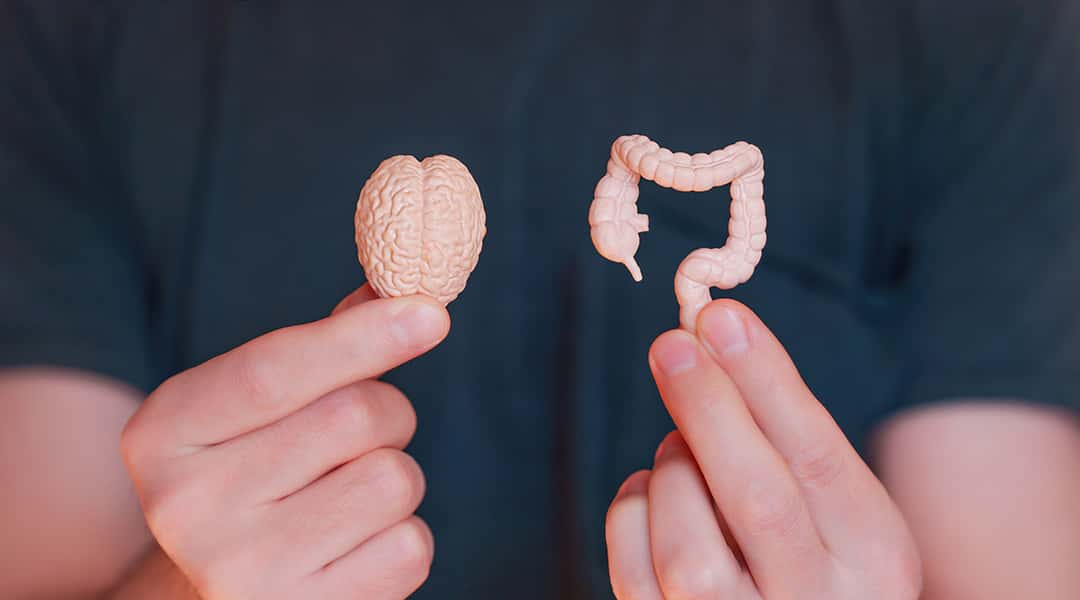Ayurveda’s Guide to the Gut-Brain Axis
Ayurveda’s Guide to the Gut-Brain Axis

The concept of the gut-brain axis, a bi-directional communication network between our digestive system and brain, has gained significant attention in modern science. However, Ayurveda, an ancient system of holistic health from India, has long recognized the profound connection between the gut (Agni) and the mind (Manas). This blog explores how Ayurvedic principles can be applied to support the gut-brain axis, with practical tips tailored specially for a European lifestyle.
Understanding the Gut-Brain Axis in Ayurveda
In Ayurveda, the gut is considered the seat of Agni, the digestive fire. A balanced Agni is crucial for proper digestion, assimilation, and elimination, directly impacting mental clarity and emotional stability. Conversely, a disturbed Agni can lead to digestive issues and mental imbalances.
Ayurveda classifies the mind into three Gunas: Sattva (clarity and calmness), Rajas (activity and restlessness), and Tamas (inertia and darkness). The state of our Agni influences these Gunas, affecting our overall mental and emotional health.
In our fast-paced modern world, the gut-brain axis holds immense importance. The pressures of daily life, coupled with processed foods and sedentary lifestyles, can disrupt this delicate balance, leading to a myriad of health issues. Understanding and maintaining the gut-brain connection is essential for several reasons.
1. Hormonal Balance:
■ The gut produces and regulates numerous hormones, including serotonin, often called the “happy hormone,” and cortisol, the stress hormone. A healthy gut promotes balanced hormone levels, contributing to emotional well-being.
■ Balanced hormones can lead to improved mood, reduced anxiety, better sleep, and overall enhanced quality of life.
2. Immune System Support:
■ A significant portion of the immune system resides in the gut. A healthy gut flora strengthens the immune response, helping the body fight off infections and diseases.
■ Strong immunity can reduce the frequency of illnesses and improve resilience against common colds, flu, and even chronic diseases.
3. Mental Health:
■ The gut-brain axis plays a crucial role in mental health. Imbalances in gut health can lead to mental health disorders such as depression, anxiety, and cognitive decline.
■ Maintaining gut health can help prevent and manage mental health issues, leading to improved cognitive function and emotional stability.
4. Metabolic Health:
■ The gut influences metabolic processes, including nutrient absorption and fat storage. Poor gut health can lead to metabolic disorders like obesity and diabetes.
■ A healthy gut can aid in weight management, enhance energy levels, and prevent metabolic diseases.
Health Challenges Avoided by Being Cautious
By maintaining a balanced gut-brain axis through Ayurvedic principles, several health challenges can be mitigated:
1. Gastrointestinal Disorders: Conditions such as IBS, acid reflux, and bloating can be prevented by supporting digestive health.
2. Mental Health Issues: Anxiety, depression, and mood disorders can be managed more effectively.
3. Autoimmune Diseases: A robust immune system can lower the risk of autoimmune conditions like rheumatoid arthritis and Crohn’s disease.
4. Chronic Inflammation: Reducing gut inflammation can help prevent chronic inflammatory diseases, including cardiovascular diseases and certain cancers.
Diet: Ingredients with Ayurvedic Principles
1. Fiber-Rich Foods:
■ Why: Fiber supports healthy digestion and microbiome diversity, which is crucial for the gut-brain axis.
■ Suggestions: Incorporate whole grains like oats, barley, and rye; root vegetables like carrots and parsnips; and leafy greens like kale and spinach.
2. Probiotics and Prebiotics:
■ Why: Probiotics nourish beneficial gut bacteria, while prebiotics serve as food for these bacteria.
■ Suggestions: Enjoy fermented foods such as sauerkraut, kefir, and yogurt. Include prebiotic-rich foods like garlic, onions, and asparagus.
3. Spices and Herbs:
■ Why: Many Ayurvedic spices support digestion and have anti-inflammatory properties.
■ Suggestions: Use turmeric, ginger, cumin, and fennel in your cooking. These can be easily incorporated into dishes like stews, soups, and salads.
4. Seasonal and Local Produce:
■ Why: Eating seasonally and locally ensures freshness and aligns with nature’s rhythms.
■ Suggestions: Visit local farmers’ markets for seasonal fruits and vegetables. In summer, enjoy berries, tomatoes, and cucumbers; in winter, opt for root vegetables and hearty greens.
Lifestyle Suggestions for a Balanced Gut and Mind
1. Mindful Eating:
■ Eating mindfully enhances digestion and absorption of nutrients.
■ Suggestions: Avoid distractions while eating. Focus on the taste, texture, and aroma of your food. Chew thoroughly and eat at a moderate pace.
2. Regular Exercise:
■ Physical activity supports digestion and reduces stress.
■ Suggestions: Engage in activities that you enjoy, such as walking, cycling, yoga, or swimming. Aim for at least 30 minutes of moderate exercise most days of the week.
3. Stress Management:
■ Chronic stress can disrupt the gut-brain axis.
■ Suggestions: Practice relaxation techniques such as meditation, deep breathing exercises, or spending time in nature. Incorporate hobbies that bring you joy and relaxation.
4. Adequate Sleep:
■ Restorative sleep is essential for gut health and mental well-being.
■ Suggestions: Establish a regular sleep routine. Ensure your bedroom is a calm, dark, and cool environment. Avoid screens and heavy meals before bedtime.
Yoga for the Gut-Brain Axis
Yoga, an integral part of Ayurveda, offers numerous benefits for the gut-brain axis by promoting relaxation, reducing stress, and enhancing digestive function. Here are some yoga postures (asanas) that support the gut-brain connection:
1. Balasana (Child’s Pose)
■ Importance: Calms the mind, relieves stress, and gently compresses the abdominal organs to aid digestion.
■ Who Should Avoid: Those with knee injuries or severe back problems should avoid or modify this pose.
2. Apanasana (Knees to Chest Pose)
■ Importance: Helps release gas, improves digestion, and relaxes the lower back.
■ Who Should Avoid: Those with hip or knee issues should perform this pose with caution.
3. Paschimottanasana (Seated Forward Bend)
■ Importance: Stimulates the digestive organs, calms the mind, and stretches the spine.
■ Who Should Avoid: Those with lower back injuries or tight hamstrings should avoid deep forward bends or modify the pose.
4. Marjaryasana-Bitilasana (Cat-Cow Pose)
■ Importance: Massages the abdominal organs, improves spinal flexibility, and reduces stress.
■ Who Should Avoid: Those with wrist or knee problems may need to modify the pose or use props for support.
5. Ardha Matsyendrasana (Half Lord of the Fishes Pose)
■ Importance: Stimulates the digestive fire, improves digestion, and enhances spinal mobility.
■ Who Should Avoid: Those with spine or shoulder issues should modify the twist or seek guidance from a yoga instructor.
Ayurvedic Herbs for Healthy Gut and Mind
1. Ashwagandha:
■ Known for its adaptogenic properties, Ashwagandha helps manage stress and supports overall well-being.
■ Usage: Available in powder or capsule form. Can be added to smoothies, teas, or taken as a supplement.
2. Triphala:
■ This traditional Ayurvedic formulation supports digestion and detoxification.
■ Usage: Usually taken as a powder mixed with warm water or in capsule form before bed.
3. Brahmi:
■ Enhances cognitive function and promotes mental clarity.
■ Usage: Available as a powder, capsule, or liquid extract. Can be taken with warm water or milk.
The principles of Ayurveda offer a timeless and holistic approach to maintaining the health of the gut-brain axis. By integrating these dietary, lifestyle, and yoga suggestions, we can harness the wisdom of Ayurveda to support our digestive and mental well-being. Remember, the key to a healthy gut-brain axis lies in balance, mindfulness, and a connection to nature’s rhythms.
Embrace these Ayurvedic practices to nurture your gut, calm your mind, and enhance your overall quality of life. By being mindful of the gut-brain connection, we can avoid numerous health challenges and lead a more balanced and fulfilling life.
Speak with our experienced Ayurvedic Doctors, today to learn more about Ayurvedic wisdom for maintaining the health of the gut-brain axis. Team ASHAexperience offers ancient Ayurvedic treatment and practices to the world for a sustainable society by offering self-care practices through Ayurveda and Yoga
#GutBrainAxis #Ayurveda #HolisticHealth #MindBodyConnection #AyurvedicWisdom
We believe in collaborative relationship-based care where our Ayurvedic Doctors, Ayurvedic Practitioner, Ayurvedic Supplement Brands, Ayurvedic Nutritionists & Chefs, Yoga, and Meditation Trainers are in sync. Contact the team who passionately works together to hold your hand in this healing journey.
